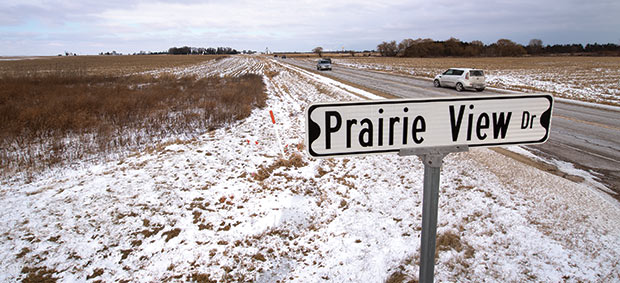Justices questioning practice of deferring to agencies’ interpretations of statutes
By: Erika Strebel, [email protected]//January 23, 2018//
Justices questioning practice of deferring to agencies’ interpretations of statutes
By: Erika Strebel, [email protected]//January 23, 2018//

The Wisconsin Supreme Court looks as though it might choose this term to end its decades-old practice of deferring to state agencies’ interpretations of statues in certain cases, possibly giving businesses and individuals more power in their dealings with those agencies.
For decades, Wisconsin courts have shown varying degrees of deference to state agencies’ interpretations of statutes. The greatest amount of deference that can be shown is called “great weight,” which judges use when an agency whose interpretation is being questioned has a considerable history of administering and interpreting a particular statute.
The topic came up last term in the case of Operton v. Labor and Industry Review Commission, in an appeal involving a woman’s challenge of an administrative-law judge’s decision to deny her claim of unemployment benefits.
Although LIRC specifically argued the ruling it had made previously in the case was owed great-weight deference, the Supreme Court decided not to take up the question of deference when it handed down a decision in Operton in May. Rather than mentioning great-weight deference, the majority of the high court justices found that the commission had simply failed to interpret a state statute at the center of the Operton case.
Several justices, though, gave hints that they would like to see questions over agency deference settled once and for all.
Justice Rebecca Bradley, in particular, wrote a concurring opinion calling for the court to take a second look at deference and do away with courts’ long-standing practice of overturning agencies’ interpretations of statute only when those interpretations can be shown to be clearly erroneous.
The practice, Bradley wrote, runs afoul of the state Constitution and does not comport with judges’ duties as elected officials. She was joined in her opinion by justices Dan Kelly and Michael Gableman.
Justice Annette Ziegler, appearing to be less quick to condemn the practice, noted in a separate concurrence that she wouldn’t be willing to agree to big changes without first seeing the question of agency deference argued out in briefs.
Chief Justice Pat Roggensack, who wrote the majority opinion in the Operton case, has also expressed some skepticism about agency deference. In a law-review article published in 2006, Roggensack warned that deference, if taken too far, does little more than give court officials a convenient excuse for avoiding the very sorts of decisions they were elected to make.
Shortly after the decision in Operton v. LIRC, the justices asked the parties in several other cases – Tetra Tech v. Department of Revenue and Wisconsin Department of Revenue v. Wisconsin Labor and Industry Review Commission – to submit briefs on the question of agency deference, in addition to other matters being considered in their appeals.
The case of Tetra Tech v. Department of Revenue is an appeal out of Brown County asking whether taxes should have been imposed not only on a firm charged with overseeing the cleanup of polychlorinated biphenyls from the Fox River but also on the firm’s main contractor. Wisconsin DWD v. Wisconsin LIRC, on the other hand, involves a dispute over whether a nurse should be able to receive workers’ compensation and jobless benefits after being fired for missing work.
The justices also later granted a review of Wisconsin Bell v. LIRC, in which deference was one of several matters up for appeal. This case is an appeal of an employment case looking at whether LIRC had properly interpreted the state’s Fair Employment Act when it found that Wisconsin Bell had discriminated against a disabled employee by firing him.
Various groups have weighed in on the merits of agency deference.
In the Tetra Tech case, amicus briefs have been submitted by the Wisconsin Utilities Association, Wisconsin Institute for Law and Liberty and 11 business associations, including Wisconsin Manufacturers and Commerce. In the Wisconsin Bell case, briefs have come from WMC and the Wisconsin Employment Lawyers Association.
In December, the court heard oral arguments in all three cases on the same day.
The justices may choose to go back to the way they had historically treated agency decisions. Under such a change, courts would still take agency interpretations into account but would be under no obligation to defer to them.
Some lawyers have contended that reverting to the courts’ old way of taking agency interpretations into account could force circuit-court judges to spend more time interpreting statutes in certain administrative-law cases, for the simple reason that courts would no longer have great-weight deference as a way of move things along faster.
Other lawyers have noted that a decision on deference practices could also affect agencies in their dealings with the businesses and people they regulate.
If officials at a regulated business now disagree with an agency’s interpretation, they know there’s a chance that great-weight deference will apply and that they could easily be constrained in their ability to parse the meaning of a particular statute. Were great-weight deference to go away, businesses and individual persons would suddenly be able to marshal a much-broader array of arguments.
Legal News
- Former law enforcement praise state’s response brief in Steven Avery case
- Eric Toney announces re-election bid for Fond du Lac County District Attorney
- Former Wisconsin Democratic Rep. Peter Barca announces new bid for Congress
- Republicans file lawsuit challenging Evers’s partial vetoes to literacy bill
- More human remains believed those of missing woman wash up on Milwaukee Co. beach
- Vice President Harris returning to Wisconsin for third visit this year
- Wisconsin joins Feds, dozens of states to hold airlines accountable for bad behavior
- Trump ahead of Biden in new Marquette poll
- Bankruptcy court approves Milwaukee Marriott Downtown ‘business as usual’ motion
- New Crime Gun Intelligence Center to launch in Chicago
- Arrest warrant proposed for Minocqua Brewing owner who filed Lawsuit against Town of Minocqua
- Wisconsin Supreme Court justices question how much power Legislature should have
WLJ People
- Power 30 Personal Injury Attorneys – Russell Nicolet
- Power 30 Personal Injury Attorneys – Benjamin Nicolet
- Power 30 Personal Injury Attorneys – Dustin T. Woehl
- Power 30 Personal Injury Attorneys – Katherine Metzger
- Power 30 Personal Injury Attorneys – Joseph Ryan
- Power 30 Personal Injury Attorneys – James M. Ryan
- Power 30 Personal Injury Attorneys – Dana Wachs
- Power 30 Personal Injury Attorneys – Mark L. Thomsen
- Power 30 Personal Injury Attorneys – Matthew Lein
- Power 30 Personal Injury Attorneys – Jeffrey A. Pitman
- Power 30 Personal Injury Attorneys – William Pemberton
- Power 30 Personal Injury Attorneys – Howard S. Sicula









